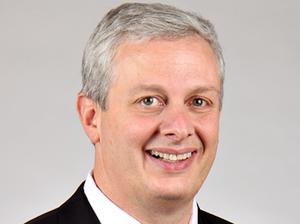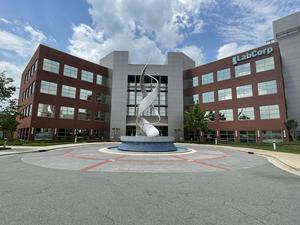Burlington is often in the shadows of larger Triad neighbors such as Greensboro and Winston-Salem. But Burlington's crown jewel — Laboratory Corporation of America Holdings — is an international company the likes of which the larger cities cannot match.
Labcorp is a global life sciences company with more than 75,000 employees and world-class capabilities in diagnostic testing, drug development and technology-enabled solutions. Labcorp has several research and testing facilities that serve as incubators for innovation and technological advancement where “ideas for addressing very specific testing needs are engineered into assays and validated.”
The company produced more than $14 billion in revenue in 2020. In the last year, it made Forbes magazine's list of the World’s Most Admired Companies and Fast Company’s list of the World’s Most Innovative Companies and was also also named one of the Best Places to Work for LGBTQ equality by the Human Rights Campaign Foundation.
With this kind of capacity and resume, it would seem Labcorp would find itself in a larger market such as New York or Los Angeles. Even in North Carolina, Raleigh’s biotech expertise or Winston-Salem's emergence as a player in medical innovation may seem like better fits.
But for Labcorp, Burlington has been home for five decades. And there’s no sign of that changing anytime soon.
Commitment to Burlington
Labcorp has gone through various iterations since 1969, when it was founded in a hospital basement by brothers Dr. James B. Powell, Thomas Edward Powell III and John Powell as Biomedical Laboratories. In 1982, Biomedical Laboratories was acquired by Hoffmann-La Roche, which merged all its companies into Roche Biomedical Laboratories. Thirteen years later, in 1995, Roche Biomedical Laboratories and National Health Laboratories merged to create Labcorp.
Through all its changes and variations, one constant has remained.
“Burlington has always held a special place for us because it’s been our beginning," said Adam Schechter, Labcorp's chairman and CEO. “I feel good about our presence here and I feel good about our presence across North Carolina.”

With 5,203 employees in the Triad and 3,207 in Alamance County, Schechter said that the relationship between the company and the city of Burlington is interactive, and the two systems feed off each other.
“Labcorp started in Burlington, and when we had our 50-year anniversary about a year and a half ago, the pride of the city was remarkable,” Schechter said. “I think it’s mutual that Burlington appreciates Labcorp and everything we bring to the community, but we also appreciate Burlington and everything that they bring to Labcorp.”
Labcorp has maintained a significant partnership with Alamance Community College (ACC), the third-largest community college in the Triad and an essential pipeline for Labcorp’s workforce.
In 1984, to support the company’s growth, Labcorp began its partnership with ACC by helping to start one of the first associate degree biotechnology programs in the country. The program at ACC is the longest-running two-year program of its kind in the nation.
Several years after the biotechnology program was started, ACC started a medical laboratory technician (MLT) program with a focus on retraining former textile workers for new laboratory careers, not only with Labcorp but also for other labs in the area.
Today, more than 600 Labcorp employees have graduated from those programs, and over 450 employees have taken at least one of 28 courses ACC offers in its business and industry training division.
ACC established its Biotechnology Center of Excellence, with Labcorp being a major funder, and will be the home for all the institution’s biotech and life sciences programs. The $17.6 million, 30,000-square-foot facility which will start construction as early as late August.
Along with its headquarters, located at 531 S. Spring St., Labcorp has purchased several spaces in downtown Burlington – including the 20,500-square-foot York Court Campus, one of the largest labs in the world and the largest testing facility within the company’s system.

Labcorp has supported the preservation of historical downtown Burlington through its occupation of multiple historic buildings in the area, including the Atlantic Banking & Trust Building, the Federal Building and thousands of square feet of office and manufacturing space abandoned by hosiery and textile companies.
“I would hate to think what Alamance County would be without Labcorp,” said Yonnie Butler, a board member with the Alamance Chamber.
Labcorp performance during Covid
Labcorp’s main priority during the most contagious pandemic in over a century was to do all it could to help.
“We started to hear about this virus that was impacting our subsidiary in China,” Schechter said. “By the time March came around, we realized that we had to play a very significant role to help through the pandemic.”
That role was broken down into four principle areas, Schechter said.
“The first one was to build as much testing capacity we can build as fast as we possibly could.”
Six months after acknowledging that they needed to act, Labcorp was providing more than 300,000 Covid-19 tests per day.
The next step was to make sure that everyone had access to their tests. Labcorp offered tests with no upfront charge.
“We just said, ‘Let’s get it out there,’ ” Schechter said.
The third principle was to eliminate any biases or advantages in the distribution of the Covid-19 tests based on priority. The administering of the tests was on a first-come, first-serve basis, except when asked by the Department of Health and Human Services to prioritize those who were hospitalized.
“The last thing was to use science, innovation and technology in every single thing that we did,” Schechter said.
![Lab4[80]](https://media.bizj.us/view/img/12070431/lab480*540xx1200-675-0-66.jpg)
For example, Labcorp developed a quicker and more efficient way of processing the Covid tests. At first, a longer nasal swab was used, and genetic material then had to be extracted from the sample before running the test to see if the virus was present. Each of those steps required different machinery and chemical reagents.
Extracting the genetic material from the swab took up to six hours to complete. But Labcorp scientists discovered a way to shorten that time to 30 minutes by using heat to extract the genetic material.
Lessons learned
The team at Labcorp was also working tirelessly on drug development and alternative treatments for Covid-19.
“We have about 40% of our revenue from drug development and we were involved in over 800 different trials for vaccines, therapeutics and other potential Covid related treatments,” Schechter said.
Schechter’s appointment as CEO came only five months before the outbreak of the Covid-19 pandemic.
“There’s no playbook for a new CEO on how to run a company (during a pandemic),” he said.
But amid the pandemic, Schechter said Labcorp picked up several valuable lessons to better position itself.
“Make sure you have some excess capacity, make sure you have a duplicative supply chain and make sure you have some type of warehousing or stockpile for critical components,” Schechter said.
![Lab5[37] copy](https://media.bizj.us/view/img/12070872/lab537-copy*540xx1200-675-0-68.jpg)
Schechter said he feels there should be more collaboration between the government and diagnostic companies to encourage building excess capacity,
It may be difficult to convince other companies to go that route because returns are typically lower if a company's stockpile is too large.
“So, if you don’t find a way to work in a private/public partnership, then it’s hard to encourage people to have excess inventory and excess capacity,” Schechter said.
“It’s very often that the CDC will work on a stockpile for critical vaccine components. I think we’ve got to find ways for public/private partnerships in diagnostics to encourage governments to work with us for the stockpiling as well as the excess capacity.”
The future for Labcorp
Even during the pandemic and despite the company’s 50% decrease in base business in March 2020, Labcorp made a concerted effort to continue its acquisition strategy.
After a strong first-quarter performance in 2021, Schechter projected the company would enter a growth period. Labcorp delivered on that promise by acquiring an autoimmune testing business from Myriad Genetics in May 2021.
Schechter said Labcorp focuses on a couple of areas when eyeing a potential acquisition. The first is if it has a strategic benefit for an area of research or development that Labcorp is currently involved in.
Second, they look to acquire regional hospitals or hospital laboratories that are accretive in their first year. Labcorp has experience integrating those kinds of businesses.
“If they meet those criteria, I do as many [acquisitions] as I possibly can as fast as I can,” Schechter said. “And our pipeline for those types of business development opportunities is very robust.”
The success Labcorp experienced with its at-home Covid-19 testing has the company looking to provide at-home testing in other areas such as sexually transmitted diseases and genomic testing.
“That was one of the biggest surprises to me, frankly, during the pandemic, was how popular our Pixel by Labcorp At-Home Collection Kit was,” Schechter said. “We realize that there’s an appeal for people to be able to stay home and be able to take their samples and send them to us.”
There are some limitations, however. With the majority of Labcorp’s central laboratories testing blood and urine samples, most employers would not allow for an unsupervised urine test and most people are not comfortable with taking their own blood.
Labcorp serves clients in over 100 countries, and Schechter said it is because of all the dedicated employees it has that they have been able to perform as they have.
“Labcorp is a powerhouse in health care. We use science, technology and innovation to really improve people’s health and improve people’s lives around the world,” Schechter said.
“And I hope Burlington is proud of the work that we do on a global basis. Because when you look across the United States, and then when you think about the world and all the products that we’ve been involved in, I would say that there are a vast majority of people that have benefited in one way, shape or form from the work that Labcorp does.”








